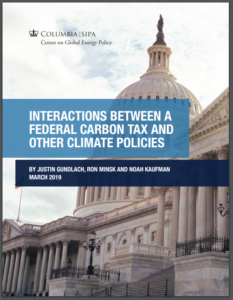Full Title: INTERACTIONS BETWEEN A FEDERAL CARBON TAX AND OTHER CLIMATE POLICIES
Author(s): JUSTIN GUNDLACH, RON MINSK AND NOAH KAUFMAN
Publisher(s): Columbia University Center on Global Energy Policy
Publication Date: March 1, 2019
Full Text: Download Resource
Description (excerpt):
Putting a price on carbon is a critical part of a low-cost strategy for reducing greenhouse gas (GHG) emissions, and a national carbon tax is a rare example of a climate change policy that has found bipartisan support in the United States. In 2018, legislation establishing a carbon tax was proposed by Democrats, Republicans, and bipartisan groups of US congressmen. However, while passing a carbon tax would certainly prove a significant step toward slashing emissions, simply adding a carbon tax to current policies is unlikely to achieve an emissions target at the lowest cost.
Designing a carbon tax that contributes to achieving greenhouse gas reduction targets effectively and efficiently will require an examination of whether other new policies are also needed and whether existing policies can or should be changed or eliminated. With more proposals expected in 2019, such an examination is critical to ensuring both sufficient emissions reductions and an efficient set of policies that keep costs in check for taxpayers.
